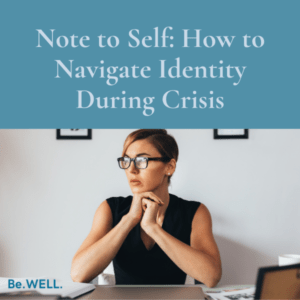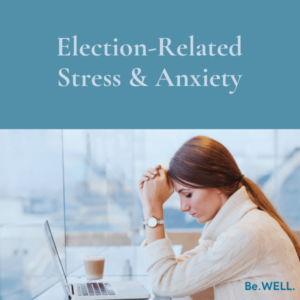Raise your hand if you have felt personally victimized by all of the change that has occurred this year. I imagine if we were all in one room together, everyone’s hands would be raised. This is understandable and to be expected. While the external world is changing rapidly and looks and feels unfamiliar, we may notice internal changes happening as well. As we adapt to new realities and unsettling circumstances, we may become more aware of subtle changes to how we see ourselves – a shift in our identity. However disorienting this may feel, reflecting on and understanding who we are can be a catalyst for growth during times of uncertainty.
What do we mean by the term ‘identity’? From psychology’s perspective, identity is how we understand and define ourselves in the context of the world, our relationships to others, and our sense of self. Aspects of identity include — but are not limited to — age, sex, gender, mental and physical health, occupation, hobbies, and socioeconomic status. When profound events occur in life — on both individual and collective levels — they can induce anxiety and perhaps raise questions about one’s identity.
It’s normal for identity conflicts to arise during a shake up in a job or a career change. Our self-image can be threatened in these instances because our routine, environment, and income have been affected. The shift to working from home or coping with temporary unemployment can disrupt the narrative of our professional identity, and leave us with overwhelming questions related to future goals and career trajectories.
A constructive way to explore who we are, who we’ve been, and who we want to be is through therapy. It may sound cliché and I may be biased, but it’s true. Working with a therapist to develop awareness and self-acceptance can reduce some of the anxiety about who we are – or aren’t – in this new normal. It’s an opportunity to be curious about how we navigate through the world and strengthen identities that are meaningful to us. All relationships require work; therapy is about working on our relationship with ourselves.
It’s imperative we also take care of ourselves outside of working with a mental health professional. Relying on a support system can play a big role in this. What does your community look like? Who are your people? During times when we’re more isolated from those who mean the most to us, it’s especially important to connect with people who can support us wherever we are in the process, and who may even be able to identify with our experience. With many of us working from home, we can become more conscious of how we relate to our space, what we allow in, and how it affects us. Self-care and boundary setting are essential to protecting our mental and physical well being. We need to be mindful of what we expose ourselves to, particularly when it comes to the news and social media. Staying informed and up-to-date with goings on is responsible and keeps us engaged. However, we also need to know when to prioritize our mental health. Knowing and respecting our limits helps us to focus on what is in our control.
The holiday season is approaching and is typically another time when our identities become questioned and move to the forefront of both our minds and family discussion. Friends and family we haven’t seen in a long time are curious to learn about us, which can bring our thoughts and feelings around our identity immediately forward. Implementing boundaries in this context can be useful. It’s also important to think about if and how the people in our lives support our identities and related decisions. How do we feel around people who are accepting and supportive? We deserve to feel seen and heard no matter what is happening externally or internally.
As we continue to look around and see all the people who have been struck by the metaphorical school bus that is 2020, know that you are not alone. Your experience and your identity, however, are your own. If there’s anything I’ve learned from working as a psychotherapist, it’s that while hardships throughout life are unavoidable and can affect how we perceive ourselves, we are resilient. We are human.
Our BeWELL Psychotherapists are well learned in a variety of fields and are here to help you become your best self. Whether you are struggling with issues related to Anxiety, Depression, Sexual Orientation, Race and Identity, school, or relationships, BeWELL therapists welcome you with an open ear at our psychotherapy practice in midtown Manhattan.
For more information check out the replay of our “Feeling Stuck? How To Explore Who You Are, Who You’ve Been, and Become Who You Want To Be” seminar.




